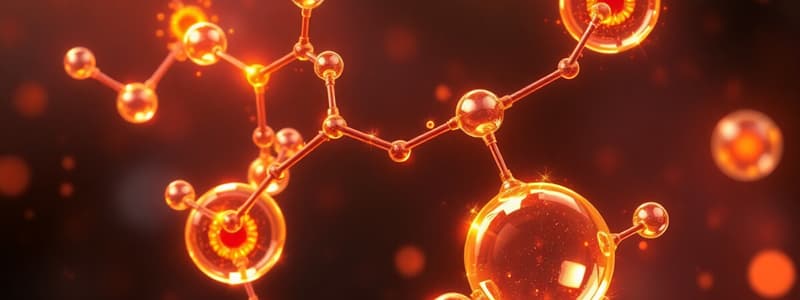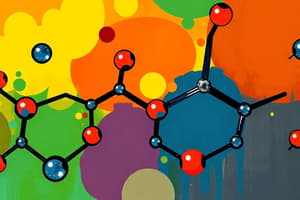Podcast
Questions and Answers
Why is carbon considered the most important element in organic chemistry?
Why is carbon considered the most important element in organic chemistry?
- It has 4 valence electrons, allowing it to form 4 covalent bonds. (correct)
- It can only form ionic bonds with other elements.
- It is limited to forming single bonds, ensuring stable structures.
- It is the heaviest element, providing structural stability to molecules.
Which characteristic of carbon atoms allows them to form a vast array of molecular structures?
Which characteristic of carbon atoms allows them to form a vast array of molecular structures?
- Their tendency to form ionic bonds instead of covalent bonds.
- Their limited ability to form isomers.
- Their ability to only bond with hydrogen atoms.
- Their capacity to bond with other carbon atoms, forming long chains, rings, or branched structures, as well as single, double, and triple bonds. (correct)
What is the general formula for alkanes?
What is the general formula for alkanes?
- $C_nH_{2n}$
- $C_nH_{n+2}$
- $C_nH_{2n-2}$
- $C_nH_{2n+2}$ (correct)
Which of the following statements accurately describes the composition of hydrocarbons?
Which of the following statements accurately describes the composition of hydrocarbons?
Which of the following organic compounds is likely to have the strongest bond between carbon atoms?
Which of the following organic compounds is likely to have the strongest bond between carbon atoms?
How are organic compounds classified into different types?
How are organic compounds classified into different types?
In the context of organic compounds, what are isomers?
In the context of organic compounds, what are isomers?
Why is organic chemistry an important field of study?
Why is organic chemistry an important field of study?
Which of the following is an example of a simple organic molecule?
Which of the following is an example of a simple organic molecule?
Which of the following is the correct pairing of the bond type and the corresponding suffix used in organic nomenclature?
Which of the following is the correct pairing of the bond type and the corresponding suffix used in organic nomenclature?
What is the primary focus of organic chemistry?
What is the primary focus of organic chemistry?
Which type of organic compound contains only single bonds between carbon atoms?
Which type of organic compound contains only single bonds between carbon atoms?
If a hydrocarbon molecule has the formula $C_5H_{12}$, to which class of organic compounds does it belong?
If a hydrocarbon molecule has the formula $C_5H_{12}$, to which class of organic compounds does it belong?
What is the relationship between the number of bonds between carbon atoms and the strength of the bond?
What is the relationship between the number of bonds between carbon atoms and the strength of the bond?
In what applications might ethyne (acetylene) be used, based on its bonding structure?
In what applications might ethyne (acetylene) be used, based on its bonding structure?
Which of these is NOT a common category in which organic compounds are found?
Which of these is NOT a common category in which organic compounds are found?
What distinguishes alkanes from other types of hydrocarbons?
What distinguishes alkanes from other types of hydrocarbons?
A compound is found to contain carbon, hydrogen, and oxygen. Is it necessarily an organic compound?
A compound is found to contain carbon, hydrogen, and oxygen. Is it necessarily an organic compound?
Which of the following best elucidates the role of biochemistry as it relates to organic chemistry?
Which of the following best elucidates the role of biochemistry as it relates to organic chemistry?
A new compound is discovered with the formula $C_4H_8$. What type of bond is most likely present?
A new compound is discovered with the formula $C_4H_8$. What type of bond is most likely present?
Flashcards
Organic Chemistry
Organic Chemistry
The branch of chemistry focused on the study of carbon-containing compounds.
Importance of Organic Chemistry
Importance of Organic Chemistry
Organic chemistry is important because organic compounds are found in medicine, food, plastics, fuels, and biochemistry.
Why is Carbon Special?
Why is Carbon Special?
Carbon is the most important element in organic chemistry because it has 4 valence electrons, allowing it to form 4 covalent bonds.
Carbon Bonding
Carbon Bonding
Signup and view all the flashcards
Bond Strength
Bond Strength
Signup and view all the flashcards
Types of Organic Compounds
Types of Organic Compounds
Signup and view all the flashcards
Alkanes
Alkanes
Signup and view all the flashcards
Hydrocarbons
Hydrocarbons
Signup and view all the flashcards
Study Notes
- Organic chemistry is a branch of chemistry studying carbon-containing compounds.
- Organic compounds show variety and include simple molecules like methane (CH4), as well as complex molecules like proteins, carbohydrates, and DNA.
- Organic chemistry's significance stems from the presence of organic compounds in medicine like pharmaceuticals and antibiotics, food like sugars and oils, plastics like polyethylene, fuels like natural gas and petrol, and biochemistry like in enzymes and hormones.
Carbon's Special Properties
- Carbon is a crucial element in organic chemistry.
- Carbon has 4 valence electrons enabling it to form 4 covalent bonds.
- Note that these are covalent bonds and not ionic.
- Carbon atoms can bond and form long chains, rings, or branched structures, making complex structures.
- The element can form single, double, and triple bonds.
- Carbon's versatility allows for a vast array of molecular structures and isomers (molecules with the same molecular formula but different structures).
- More bonds equal more strength.
Types of Organic Compounds
- Organic compounds are classified into different types based on their structure and bonding.
- Important types of organic compounds include cycloalkenes and arenes.
- "ane" indicates a single bond
- "ene" indicates a double bond
- "yne" indicates a triple bond
Alkanes (Saturated Hydrocarbons)
- Alkanes feature single bonds between carbon atoms.
- The general formula for alkanes is CnH2n+2
- Examples of alkanes include Methane (CH4), Ethane (C2H6), and Propane (C3H8).
Hydrocarbons
- Consist of only hydrogen and carbon atoms.
Studying That Suits You
Use AI to generate personalized quizzes and flashcards to suit your learning preferences.




